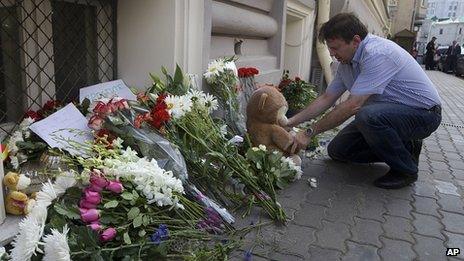MH17 crash brings Ukraine conflict 'to West's door'
- Published

Tributes are pouring in for the victims of the Malaysia Airlines plane crash
Ukrainian and Russian media differ sharply in their coverage of the Malaysia Airlines Flight MH17 crash. The story dominates Ukrainian media, but fights for space among reports on Western sanctions and other stories in Russia.
Commentators and members of the public are united on Ukrainian television channels in accusing the separatists and Russia of shooting the plane down.
One theme that comes through strongly is the hope that the worldwide dimension of the tragedy might focus attention on Ukraine's problems.
'Turning point'
One woman in the crowd of people laying flowers at the Dutch embassy in Kiev, told STB TV, external that the "remote local conflict" in eastern Ukraine was "now knocking at the West's door".
A similar sentiment is common on Ukrainian social media, where users say the crash should be a wake-up call for the West and prompt it to impose tougher sanctions against Russia.
The press also sees wider significance in the crash. One commentator in the popular daily Segodnya, external says the crash is a "turning point" in the conflict: "From now on this is an international conflict. Whatever Russia says now, its propaganda will no longer work."
Another Segodnya writer hopes the West will send Ukraine advanced arms or even deploy troops.
The generally pro-Russian daily Vesti, external says the crash may a mark a "point of no return", and Ukraine and Russia could descend into full-scale war: "It could be a turning point in the situation in Ukraine, and even world history".
'Political dividends'
Not all of Russia's more tightly-controlled broadcast media lead on the story. Pro-government channels continue to press the official line that the separatists do not have weapons capable of shooting down an airliner, and that Ukraine is to blame.
Pro-government dailies and tabloids accuse Ukraine and its media of trying to exploit the tragedy, while independent broadsheets provide more balanced coverage.
Pro-Kremlin Izvestiya, external says: "Kiev rushed to make political dividends from the tragedy, and the Ukrainian media unleashed a major campaign to blame the crash on the separatist militia."
The populist tabloid Tvoi Den, external says "witnesses" told it a Ukrainian military plane was seen tracking the airliner at high altitude.
Analyst Alexei Arbatov tells the liberal RBK Daily, external that the implications for Russia could be ominous - "if this situation ends up escalating into a new Cold War, the consequences for Russia would be far graver than they ever were for the USSR, since Russia is not a global superpower".
BBC Monitoring, external reports and analyses news from TV, radio, web and print media around the world. For more reports from BBC Monitoring, click here. You can follow BBC Monitoring on Twitter , externaland Facebook, external.